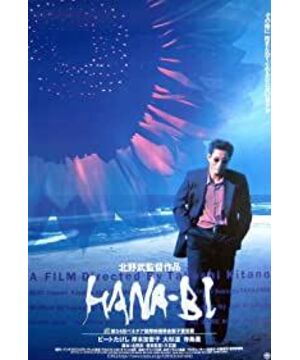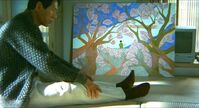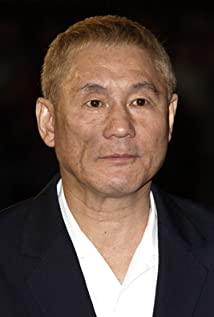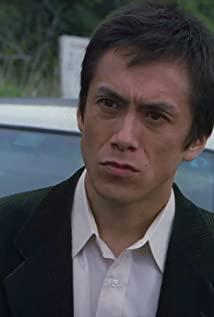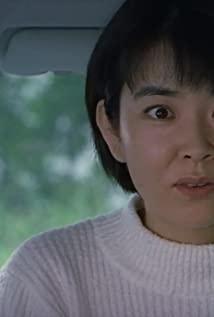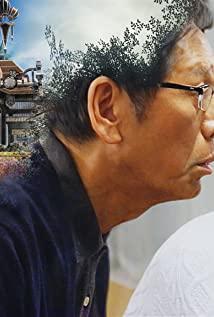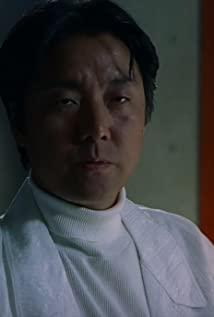"I long for such a lover, he is - gentle robber, law-abiding rogue, patient liar", I think no one can afford "gentle robber, law-abiding rogue, patient liar" better than Takeshi Kitano "This title. If the Japanese cultural model studied by the famous anthropologist Ruth Benedict is used to reflect Kitano, the cultural characteristics of "chrysanthemum and sword" seem to hold true in him, gentle and violent, serious and playful, two characteristics simultaneously exist. Just like the name of the film it represents - "Double-sided Takeshi Kitano". Before Kitano Takeshi became Kitano Takeshi, he was Peter Takeshi, a comedian and a manga teacher. In the Japanese drama "Spark", which tells about a pair of mangai masters and apprentices chasing their dreams and surviving their lives, Mangai is described in this way, "The so-called mangai does not belong to those who can imagine interesting things, but is willing to expose the truth without pretense. A person with a posture. That is to say, one must face the desire and live frankly." On the road from Peter Take to Kitano Takeshi, Kitano Takeshi's frankness is always reflected in his artistic creation. "Hana" was released in 1997. According to Takeshi Kitano, this is a work of revenge. After he was involved in a car accident while driving a motorcycle late at night in 1994, some media wrote an article saying "Take Kitano is over", so he held back He worked hard to finish the film. Takeshi Kitano once again proved himself with his strength. The film "Hanawa" won the Golden Lion Award at the 54th Venice Film Festival. He is also known as "the standard bearer of the Japanese film renaissance". "Hana" tells the story of Takeshi Kitano's police officer Kei Nishi who failed in a mission, his partner Tanaka died tragically, and Horibe was paralyzed. His life became more and more difficult after taking the blame and resigning. He borrowed loan sharks to buy painting tools for Horibe in an attempt to restore Horibe's confidence in life. , and chose to rob the bank to provide the life allowance for Tanaka's widowed wife, and fulfilled the wish of his dying wife. This article attempts to analyze the text of the film through color, sound and imagery of fireworks. As a filmmaker with three identities of screenwriter, director, and actor, Takeshi Kitano's films have authorship that can be recognized at a glance. "Fireworks" is melancholy and calm. The blue tones, the graceful and lyrical Hisaishi soundtrack, the frugal and clean lines, and the calm and restrained depiction of violence create a unique aesthetic that expresses a sense of a life through Hamlet's "To be or to be"-style display of difficult situations. Existential questioning of life and death. 1. Kitano Blue "Kitano Blue" is the blue named after Takeshi Kitano, which is different from "Tiffany Blue" as a consumer culture and brand identity. Just as red is used as a traditional Chinese cultural symbol in films such as "The Case of Qiu Ju", "Red Sorghum", and "High Red Lanterns", "Kitano Blue" has also become a cultural symbol of Japan in this sense. The French painter Kandinsky once said: "The color is the keyboard, the eye is the harmony, and the soul is the multi-string piano. The artist is a hand, playing with a key, thereby causing the vibration of the soul." Of course, the film fully applies his In other words, the screen is a canvas on which images are displayed. In the film "Fireworks", blue is the basic color block and tone. In "Blue, White, Red and Blue", Kieslowski used light blue crystal lighting, a blue room in the countryside, a blue swimming pool in a new apartment and other elements to express the protagonist's sadness and enhance the atmosphere of the film. Its blue is embodied in various artificial creations, and it is a European middle-class melancholy, while the blue of "Fireworks" is ecological and naturalistic. The blue of "Fireworks" is first and foremost the blue of the sky and the sea. As an island country, Japan is surrounded by the sea, and the image of the sea is reflected in various artistic creations. The Caspian Sea is the place where pure youthful love occurs in "That Summer, the Peaceful Sea", and the Caspian Sea in "Kiujiro's Summer" is a road trip. The scenery with childlike innocence is Hirokazu Koreeda's "Sea Street Diary", the sea is the place where the four sisters play on the waves and are full of laughter and laughter, and the sea in Naoko Ogigami's "The Secret Seam of Life" is the organ and soul woven by burning wool. A place to be healed. The sea is a field full of stories and romance, and it is also a symbol of Japanese nationality. Katsushika Hokusai's color Ukiyo-e print "The Great Wave off Kanagawa" depicts the stormy waves like "eagle claws" and the distant Mount Fuji, which seems to open to the world declare: "That's Japan." The sea in "Fireworks" is beautiful in the sense of visual aesthetics, melancholy and despair in the expression of meaning, and is often associated with death. Horibe, who is in a wheelchair, has always been alone at the beach, listening to the sound of the waves crashing on the shore. Xi Jiajing's wife was watering a dying flower by the sea, passers-by teased that no amount of sea water could revive the flower, and was beaten by Xi Jiajing, a scene suggesting that the two could not escape the shadow of death . At the end of the film, the picture is gradually pulled away and higher, leaving the embracing couple to shoot the blue sky and sea. Suddenly there are two gunshots outside the picture, implying the two people's sacrifice, the movie goes dark, only the waves are left. The voice, Hai witnessed the death of the two. Kitano said: "Whenever I approach the sea, I feel a lurking violence, a terrifying tension that fascinates me as a man and a director, but it also terrifies me. I have never I never immerse myself in the sea.” It is true that the image of the sea in the film symbolizes danger. The couple who sacrificed their love are as calm as the ocean when they face death. Deathly calm. The blue in "Fireworks" is still a shade of blue formed by a filter, wrapped in the night and day, like a layer of glass. On the night when Xi Jiajing and his wife set off fireworks, blue is the color of his wife's coat, the dark blue night sky, and the night covering the grass. In the passage where Xi Jiajing is looking for loan sharks at night, the entire snow is covered with moonlight, reflecting the deep blue, and the quiet blue contains sudden violence. Xi Jiajing shoots and kills him in the car. After two people, the low angle shot revolves around the car in the snow, like a whirlpool in the sea. "We had to intervene in the color film, remove its usual authenticity and replace it with the authenticity of the time." Antonioni's "Red Desert" sprayed color on the location to create an inner, psychological feeling. Color is no longer just based on reality as the only standard, but reflects the psychological state of the protagonist. In the film "Fireworks", "Kitano Blue" not only reflects the "quiet, light, and pure" oriental temperament of the Yamato nation, but also shows the cold-eyed feeling of "seeing things through glass", but also the director's emotion and the character's emotion. It leaks out, as if a paintbrush is full of paint depicting the outline of the soul, creating shadows, sorrows, sorrows and sorrows in various shades of blue. The blue that is infinitely close to melancholy creates a feeling of "when you stare into the abyss, the abyss is also staring at you". 2. Speech and language In the film, Kitano Takeshi said less than 20 lines, and Kishimoto only had one line, which was "Thank you, thank you for everything" at the end. A prominent feature of the film is the substantial reduction in the amount of lines. The neatness of the lines creates the effect of Xi Jiajing and his wife being speechless and mute when they get along. The way of expression has formed the thinking on life and death at the philosophical level. Takeshi Kitano removed the language and chose to use a large section of lyrical music in the film, so that emotions can be revealed and expressed in the music. There are often scenes in the film where Xi Jiajing and his wife "look at each other and smile, and don't go back to their hearts". It seems that all the affection is unspoken, and the secret code of the soul is completed in an instant. For example, Xi Jiajing and his wife are playing a card game in the car. Xi Jiajing can see the card pattern through the reflection of the front mirror of the car. His wife is surprised by Xi Jiajing's "super power" and covers the card surface with chocolate. , The two laughed a lot; when the couple took a photo in front of the temple, the camera lens of the posing was blocked by a passing car, and the two who failed to take pictures looked at each other and smiled. In their relationship, eyes and smiles replaced words, and the tacit understanding and familiarity of the two were expressed in silence, and the deep emotion of husband and wife was reflected. "cooperation" silent communication behavior. Someone laughed and said that nowadays the hero and heroine of TV series say "I love you" every ten minutes. As a cheap and convenient tool of expression, language loses its effectiveness in the flood, and nothing is easier than a vow, so those smart directors make the hero and heroine become dumb when they fall in love, and it is enough to shoot two pairs of eyes. On an aesthetic level, the silence is full of pain, just as the seemingly calm sea is actually turbulent. In the common experience of the two, losing their daughter has become a wound that can never be healed. For his wife, "having leukemia is far less than losing her daughter." In the film, Horibe's picture of a family of three getting together under the huge and beautiful fireworks is his own yearning for the family, and it is also a hint of the loss of his daughter by Xi Jia Jing and his wife. The silence is due to the pain of memories shared by the two. After the tragic incident, all the crying and screaming are powerless and weak, and it seems that they can only accept it silently in the face of the tragedy. In a philosophical sense, silence is the protagonist's aphasia in the face of death, and it also inspires the audience to participate in philosophical propositions about life and death. It's hard to say whether Xi Jiajing is rational or crazy. Said he was crazy, but he seemed to be adhering to a high degree of rationality and self-control like the Stoics, and he implemented the plan of sacrifice for love very calmly, "change everything I can change, accept everything I can't change", is a complete pessimism host Righteous and fatalist. Speaking of his rationality, he is like Epicurean hedonism, as if "happiness is the whole of life", and in the face of death, he will once again bloom with beautiful fireworks. The film puts the audience in a highly assumed dramatic situation, not only showing the character of Xi Jiajing, who coexists rationality and madness, but also throws out a classic philosophical proposition about "fatalism" and "free will". Marx once said: "On the stage of history, people are both playwrights and actors at the same time." Is Xi Jiajing a playwright or an actor when writing his own life history, and how much "freedom does his choice of suicide in disguise contain?" will" The determinant of this is the philosophical discussion implicit in the film's text. Takeshi Kitano's films often choose the simplicity of his lines, not only for artistic considerations, but also for the influence of Japanese traditional culture and aesthetic habits. "In the life of Japanese people, rap is discriminated against, and silent work is regarded as a virtue." Therefore, the Japanese nation is called a "silent nation". beliefs, that is, "word spirit" (the inner spirit of language) belief. According to the "Record of Ancient Matters", "Even if I say something evil, even if I say something good, it is the god of judgment." Language has powerful power, so it is necessary to speak carefully, which may have influenced Takeshi Kitano to a certain extent. 's creation. Of course, the soundtrack of the Japanese music master Joe Hisaishi adds a lot to the artistic charm of "Hanawa". The beautiful and tactful music fills the gap left by the frugality of words, weakens the bloody feeling of the violent scenes of the film, and adds a touch of romance. Color and lyricism. 3. The title of the film "HANA-BI" is literally translated as "Flower-Fire". The flower and fire are separated by symbols, so that the title of the film contains two images, one is the flower that exists in nature, and the other is when it blooms. Fireworks like flowers. Whether it is a movie title or a movie image, "flowers" and "fireworks" exist as images of life. In the Japanese aesthetics, which emphasizes grief, seclusion, and wabi-sabi, the beauty that is fleeting and short-lived is highly respected. "Flower" has always been one of the most important images in Chinese classical literature, ranging from "injuring the cymbidium orchid, bearing the brilliance; outdated and unharvested, it will wilt with the autumn grass" to "the flower floats and flows by itself. A kind of lovesickness. , two leisurely worries"; from "the forest flowers withered the spring red, too hastily" to "the most unretainable in the world, the vermilion of the mirror and the flower of the tree", the flowers all reflect the image of oriental aesthetics, and the flowering period is often used. When people think of the duration of life, the blossoming and falling of flowers also reminds people of the cycle of life, old age, sickness and death. Flowers are an important image in the film. When Nishi Jiajing and his wife traveled, Japan's national flower cherry blossoms appeared, covering the mountains and trees, falling pink and red, and the flowers fell like rain; when the paralyzed Horibe was about to paint, he went to the flower shop to see flowers. In his imagination, flowers became The image in his paintings, his paintings have a lion with a sunflower head, a bat with a crabapple head, and even a woman with a lily head in a kimono. Horibe's paintings that appear in the film are those of Takeshi Kitano. The colors are bright and bright. All the faces of animals and people are replaced by different flowers. The meaning of "flowering season", Wang Wei wrote in "Xinyiwu": "The hibiscus flowers at the end of the wood, the red calyx in the mountains. The streams are empty and empty, and they bloom and fall." The Zen meaning of silence contained in it is probably similar to Kitano Takeshi's paintings. "Fireworks" is another important image of the film. Fireworks are a more desperate and bleak beauty, because they only bloom for a moment. In the film, whether it is the fireworks set off by Kei Nishi and his wife, or the fireworks painted by Horibe, they all show a kind of sadness and desolation. The Summer Festival Fireworks Festival is a traditional Japanese cultural project and a festival to gather with family and friends. , while Xi Jiajing and his daughter are separated by yin and yang. The ceremony of watching fireworks is more like a ceremony of mourning and missing. Horibe was abandoned by his wife and son. He painted fireworks to relieve loneliness, but in turn constituted self-pity in a lonely situation. . The images of "flower" and "fire" symbolize the fate of life and death. Takeshi Kitano uses "flowers" and "fire" to describe Xi Jiajing's life choices. The vivid image of fireworks and the inner choice of death form a dramatic mutual reference, which embodies Kitano Takeshi's meditation on the destruction of individual life. The image symbol of fireworks in the film becomes the expression of poetry and beauty, and it is also a lament for fate. As Xi Jiajing's police colleague said, "I can't live as beautiful as him", Xi Jiajing chose to burn beautifully, Towards the silence of death in burning. Zhang Ailing said: "I don't like the heroic. I like the tragic and the heroic, and I prefer the desolation. The heroic is just strength, without beauty, it seems to lack humanity. Sadness is like the color of red and green, which is a strong contrast." In this sense Said, "Fireworks" is probably close to the sadness of life. No matter how arrogant and beautiful you are, you can't escape the fate of flowers and fires. Even the gunshot at the end is like a lit fireworks. fell. "I don't like the heroic. I like the tragic and the desolate. The heroic is just strength, without beauty, it seems to lack humanity. Sadness is like the color matching of red and green, which is a strong contrast." In this sense, " "Fireworks" is probably close to the sadness of life. No matter how arrogant and beautiful you are, you can't escape the fate of flowers and fires. Even the gunshot at the end is like a lit fireworks. fell. "I don't like the heroic. I like the tragic and the desolate. The heroic is just strength, without beauty, it seems to lack humanity. Sadness is like the color matching of red and green, which is a strong contrast." In this sense, " "Fireworks" is probably close to the sadness of life. No matter how arrogant and beautiful you are, you can't escape the fate of flowers and fires. Even the gunshot at the end is like a lit fireworks. fell. "I don't like the heroic. I like the tragic and the desolate. The heroic is just strength, without beauty, it seems to lack humanity. Sadness is like the color matching of red and green, which is a strong contrast." In this sense, " "Fireworks" is probably close to the sadness of life. No matter how arrogant and beautiful you are, you can't escape the fate of flowers and fires. Even the gunshot at the end is like a lit fireworks. fell. "I don't like the heroic. I like the tragic and the desolate. The heroic is just strength, without beauty, it seems to lack humanity. Sadness is like the color matching of red and green, which is a strong contrast." In this sense, " "Fireworks" is probably close to the sadness of life. No matter how arrogant and beautiful you are, you can't escape the fate of flowers and fires. Even the gunshot at the end is like a lit fireworks. fell.
View more about Fireworks reviews


